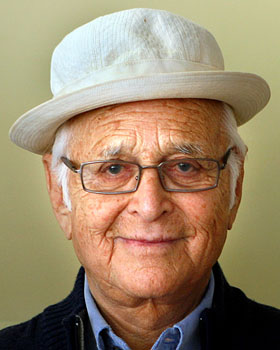For a stretch in the 1970s, television producer Norman Lear had nine shows on the air at once—with four in the top ten Nielsen ratings. He marvels at his own prodigious output in Even This I Get To Experience, a new witty and exhaustive autobiography.
Born in 1922, young Norman got off to a bumpy start. During the Great Depression, when he was 9, his father Herman went to prison for selling fake bonds to a Boston brokerage house. Norman shuttled among various relatives in Chelsea, Mass., while his mother and sister moved two hours away to New Haven, Conn. This abandonment would haunt Lear most of his life. By the time his father was released, Norman had found a new role model: his uncle Jack, a publicist. This, he decided, is what he would be when he grew up.
After the Japanese bombed Pearl Harbor, Lear enlisted in the Air Force, flying on more than 50 bombing missions and finding time to marry the first of three wives. After his return, he packed up his family and headed west, lucking into a writing gig for Dean Martin and Jerry Lewis. He quickly realized — both monetarily and emotionally — that comedy was home.
When Lear began his career in television in the early 1950s, he found the medium soulless. “For twenty years—until All in the Family came along—TV comedy was telling us there was no hunger in America, we had no racial discrimination, there was no unemployment or inflation, no war, no drugs, and the citizenry was happy with whomever happened to be in the White House,” he writes.
Lear wanted more realism, and he used his “rascal” father as inspiration for Archie Bunker. Many of his iconic shows—All in the Family, Sanford & Son, The Jeffersons, and Maude—wrung comedy from serious subjects: racism, poverty, drugs and abuse. Maude Findlay’s abortion storyline was the first time a leading character on a primetime show underwent the procedure. The episode aired in 1972, a year before the landmark Roe v. Wade decision decriminalized abortion in the early months of pregnancy.
Actress Esther Rolle made a vivid impression in her supporting role as Florida Evans, Maude’s housekeeper, and Lear recruited a few black writers to script a spin-off featuring Florida and her family. The resulting show, Good Times, was the first television show to feature a two-parent African-American family. It debuted to high ratings and proved to have wide appeal, attracting a viewership that was 60% white.
But such a high-wire act brought new challenges. Lear recounts going toe-to-toe with Rolle and co-star John Amos in the writer’s room. Rolle and Amos insisted certain lines be scrubbed, arguing that black people didn’t use certain vernacular. One story involved Jimmie Walker’s character, J.J., painting a black Jesus. Rolle considered the episode blasphemous. Lear was tickled: “Odd that the largely white writing staff of a show about a black family was defending the notion of a black Jesus to a black woman.”
When Walker’s J.J. ad-libbed “Dy-no-mite!,” he thrilled audiences but dismayed Rolle and Amos, who found his portrayal too buffoonish. Weighted by distrust and exhausted on both sides, Good Times wheezed to six seasons. The idea for Lear’s next sitcom, The Jeffersons, came out of a Black Panthers’ critique. Lear recalls the men stopping by his office to demand better representation: “Every time you see a black man on the tube he is dirt poor, wears shit clothes, can’t afford nothing.” George Jefferson, owner of a successful dry cleaning chain, was born.
Lear estimates he helped develop more than 100 shows, producing The Facts of Life, Who’s the Boss and 227. In 1999, President Bill Clinton awarded him the National Medal of Arts for “changing the way we look at American society.”


